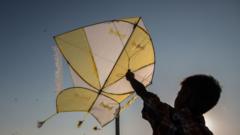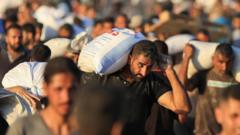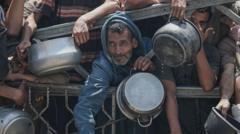The recent closure of UN-run schools in East Jerusalem by Israeli forces has generated worldwide condemnation and highlighted the ongoing conflict over Palestinian rights to education.
Israeli Forces Shut Down UN Schools in East Jerusalem, Sparking Outcry

Israeli Forces Shut Down UN Schools in East Jerusalem, Sparking Outcry
Israeli Security enforces school closures, raising concerns over children's rights to education in Shuafat refugee camp.
Israeli security forces have forcibly closed three schools operated by the United Nations Relief and Works Agency for Palestine Refugees in the Near East (UNRWA) located in the Shuafat refugee camp in East Jerusalem. The closures occurred shortly after classes commenced on Thursday, resulting in hundreds of Palestinian students being sent home. Philippe Lazzarini, the Commissioner-General of UNRWA, criticized the Israeli authorities for infringing on the children's fundamental right to education, describing the action as a "blatant disregard of international law."
The closure comes amid a broader ban on UNRWA initiated by Israel earlier this year, which argues that the agency has been compromised by Hamas. UNRWA has rejected these accusations, maintaining that it operates independently and impartially. Disturbing videos captured the emotional turmoil of students, particularly girls, embracing one another outside the shuttered school, as the Israeli forces displayed a closure order prominently posted on school premises.
According to UNRWA, over 550 children aged six to fifteen were present at the schools at the time of their closure, and one staff member was reportedly detained, adding to the distressing atmosphere for young students who now face potential educational disruption. Lazzarini took to social media platform X to express his outrage, advocating for the necessity of keeping UNRWA schools operational to protect the educational opportunities of an entire generation.
In response, the Palestinian Authority condemned the actions as violations of children's educational rights, while the British consulate in Jerusalem echoed similar sentiments, criticizing the closure orders and expressing solidarity with students and educators. The closures draw attention to the longstanding tensions surrounding education and humanitarian access in the region, with UNRWA having provided education services in East Jerusalem since 1950.
Israeli legislation enacted in the previous year further restricts interactions between Israeli officials and UNRWA, raising concerns about the agency's future operations within Israeli-controlled territories. East Jerusalem, captured by Israel during the 1967 war and unilaterally annexed in 1980— a status not recognized by much of the international community—remains a contentious point in the Israeli-Palestinian conflict. Currently, the area is home to approximately 230,000 Israeli settlers and 390,000 Palestinians, with the settlements facing backlash due to their perceived illegality under international law, a position reaffirmed by a recent ruling from the International Court of Justice.
The closure comes amid a broader ban on UNRWA initiated by Israel earlier this year, which argues that the agency has been compromised by Hamas. UNRWA has rejected these accusations, maintaining that it operates independently and impartially. Disturbing videos captured the emotional turmoil of students, particularly girls, embracing one another outside the shuttered school, as the Israeli forces displayed a closure order prominently posted on school premises.
According to UNRWA, over 550 children aged six to fifteen were present at the schools at the time of their closure, and one staff member was reportedly detained, adding to the distressing atmosphere for young students who now face potential educational disruption. Lazzarini took to social media platform X to express his outrage, advocating for the necessity of keeping UNRWA schools operational to protect the educational opportunities of an entire generation.
In response, the Palestinian Authority condemned the actions as violations of children's educational rights, while the British consulate in Jerusalem echoed similar sentiments, criticizing the closure orders and expressing solidarity with students and educators. The closures draw attention to the longstanding tensions surrounding education and humanitarian access in the region, with UNRWA having provided education services in East Jerusalem since 1950.
Israeli legislation enacted in the previous year further restricts interactions between Israeli officials and UNRWA, raising concerns about the agency's future operations within Israeli-controlled territories. East Jerusalem, captured by Israel during the 1967 war and unilaterally annexed in 1980— a status not recognized by much of the international community—remains a contentious point in the Israeli-Palestinian conflict. Currently, the area is home to approximately 230,000 Israeli settlers and 390,000 Palestinians, with the settlements facing backlash due to their perceived illegality under international law, a position reaffirmed by a recent ruling from the International Court of Justice.




















